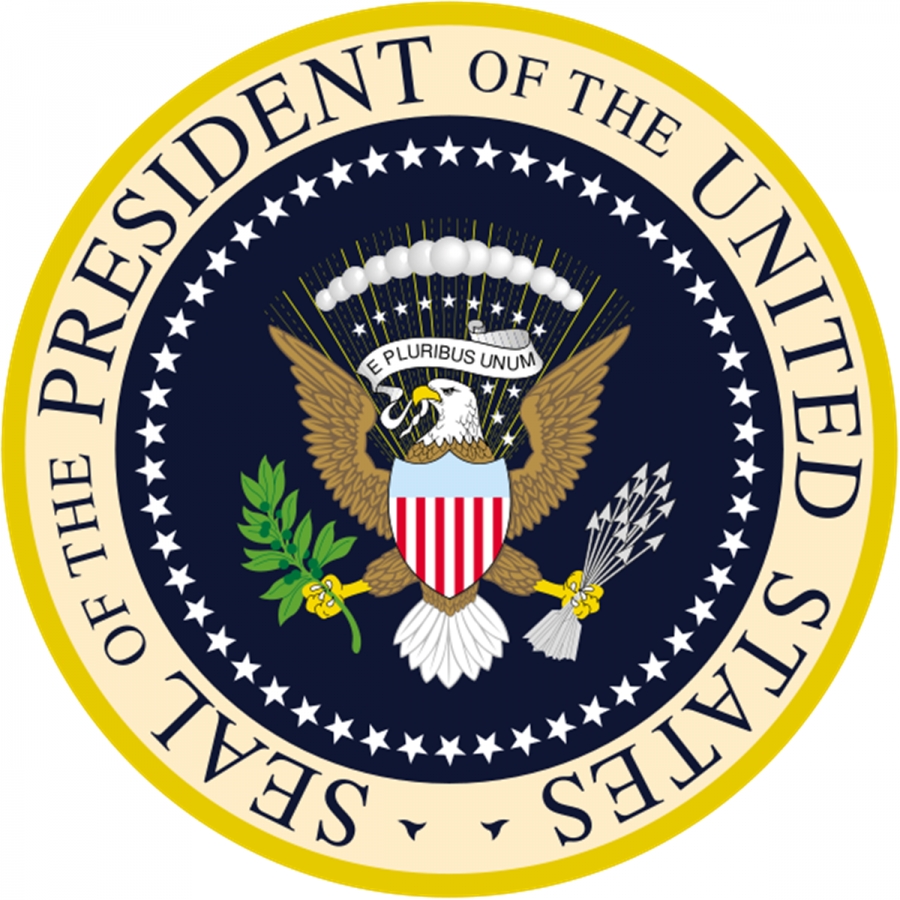
PAST PRESIDENTS' HEALTH
Hail to The (unhealthy?) Chief
All US Presidents have struggled with medical problems
before and during their time in office.
|
Click on image to see full size poster
|
Quick Facts:
George Washington (1789-1797) had nine deadly diseases.
Franklin Pierce (1853-1857) suffered from depression after his son was decapitated in a train accident.
Grover Cleveland (1885-1889 & 1893-1897) had secret surgery aboard a yacht in the Long Island Sound.
Woodrow Wilson (1913-1921) had a stroke and relied on his wife to handle most administrative duties.
Calvin Coolidge (1923-1929) suffered from severe depression after his son died from an infection caused by a blister which developed during a tennis match on the White House lawn.
Franklin D. Roosevelt (1933-1945) made numerous visits to the hospital under assumed names including Ralph Frank, George Adams and John Cash.
Dwight E. Eisenhower (1953-1961) signed, without fanfare, the Federal-Aid Highway Act of 1956 while sitting in a hospital room recovering from surgery. Marilyn Monroe and Arthur Miller married the same day.
John F. Kennedy (1961-1963) was given the last rights several times before he became president.
Lyndon B. Johnson (1963-1969) showed off the scar he received from gall bladder surgery.
Ronald Reagan (1981-1989) lost half his blood after an assassin’s bullet landed one inch from his heart.
George H.W. Bush (1989-1993) vomited in the lap of the Japanese Prime Minister.
William Jefferson Clinton (1993-2001) gave a blood sample for a DNA test in the Monica Lewinsky scandal.
George W. Bush (2001-2009) passed out eating a pretzel.
FAQs:
Who are all the US presidents?
The White House maintains a list of the US presidents with brief (and sanitized) biographies of each.
What ailments did the US presidents have?
There is no one authoritative compilation of all the medical conditions of the US presidents, but a few researchers have addressed the issue.
Which US presidents died in office?
- William Henry Harrison - April 4, 1841, died of pneumonia.
- Zachary Taylor - July 9, 1850, died of cholera.
- Abraham Lincoln - April 15, 1865, died by assassination.
- James Garfield - September 19, 1881, died of blood poisoning after an assassination attempt.
- William McKinley - September 14, 1901, died by assissination.
- Warren G. Harding - August 2, 1923, died of pneumonia.
- Franklin D. Roosevelt - April 12, 1945, died of a cerebral hemorrhage.
- John F. Kennedy - November 22, 1963, died by assassination.
Have US presidents hidden their health condition?
US presidents and candidates for president have a history of hiding or at least minimizing the seriousness of their medical ailments.
- Chester Alan Arthur 1881-1885 hid Bright’s disease. He died two years after the end of his one and only term.
- Grover Cleveland 1885-1889 had secret cancer surgery on a yacht in the Long Island sound.
- Woodrow Wilson 1913-1921 had a series of strokes before he became president—a fact kept from the public.
- Warren G. Harding 1921-1923 suffered from severe heart disease, yet his physician at the time claimed he had food poisoning and indigestion.
- Franklin D. Eisenhower 1933-1945 made numerous trips to the hospital using a host of aliases.
- Dwight D. Eisenhower 1953-1961 had Crohn’s disease which his physican originally kept from the press.
- John F. Kennedy 1961-1963 had adrenal problems which he and his administration never publically identified as the more serious Addison’s Disease.
For additional information on hidden health issues among US presidents, read Deception, Disclosure and the Politics of Health
Two books also address this issue:
- The Mortal Presidency: Illness and Anguish in the White House by Robert E. Gilbert
- Hidden Illness in the White House by Kenneth R. Crispell and Carlos E. Gomez
What kind of medical care do US presidents receive?
US presidents prior to 1945 had personal civilian or military physicians. Since 1945, US presidents have relied on the White House Medical Unit, which is comprised of physicans, nurses and physician assistants. The Medical Evaluation and Treatment Unit at Bethesda Naval Hospital provides additional support to sitting US presidents and the vice-presidents.
For more information on the White House Medical Unit, read The White House Military Office
For an interview with Eleanor Concepcion “Connie” Mariano who was the lead physician of the White House Medical Unit for George H.W. Bush, William Clinton and George W. Bush, read Presidents As Patients: An Interview With Dr. Connie Mariano
For reminences of other former physicians to the US President, read White coats in the White House: Former presidential physicians reflect on their service
Which US presidents had surgery in office?
- Grover Cleveland (1885-1889) had secret cancer surgery on board a yacht in the Long Island sound.
- Dwight D. Eisenhower (1953-1961) had surgery for ileitis.
- Lyndon B. Johnson 1963-1969 had gall bladder surgery.
- Ronald Reagan (1981-1989) had surgery after an attempted assassination and later to treat cancer.
- George W. Bush (2000-2008) had surgery for colonic polyps.
Did illness affect US president ability to govern?
This question is difficult to answer.
- Franklyn Pierce (1853-1857) suffered from depression related to the de-capitation of his son in a train accident. Researchers suggest he chose his cabinet members who were better cheerleaders than admninistrators. Pierce himself wrote: “How I shall be able to summon my manhood and gather up my energies for all the duties before…” The impairment of Presidents Pierce and Coolidge after traumatic bereavement
- Woodrow Wilson 1913-1921 suffered a stroke and didn’t attend a cabinet meeting for nine months. Historians suggest that Wilson’s wife was the defacto head-of-state during his illness. Read (Hidden Illness in the White House by Crispell and Gomez).
- Calvin Coolidge 1923-1929 suffered from depression after the death of this 16 year old son and appeared listless and disengaged from the political process The impairment of Presidents Pierce and Coolidge after traumatic bereavement However, at least one commentator suggested his attitude and governing style fit the times very well (Walter Lippman, 1926)
- Franklin D. Roosevelt 1933-1945, despite having polio and suffering from hypertension for which he made numerous hospital visits, continued to govern the nation, conduct the wars in Europe and Asia, travel abroad to meet with allies and get re-elected several times. (Read: Hidden Illness in the White House by Crispell and Gomez).
- John F. Kennedy 1961-1963 suffered from chronic back pain and was treated for Addison’s Disease, yet he appeared to lead the nation with “vigor”. (Read: The Mortal Presidency by Robert Gilbert).
Do US presidents have shorter lives than normal?
Research into presidential longevity has led to differing conclusions. Some findings suggest US presidents experience accelerated aging while in office. However, other (disputed) findings conclude that US presidents appear, on average, to live longer than normal. No one seems to doubt that being president is stressful. The question remains as to what affect that kind of stress has on lifespan.
For a summary of the research and the debate on presidential longevity, read Do U.S. Presidents Age Faster While in Office?
How does the US government handle the transfer of power in the event of a President’s inablity to discharge the duties of the office?
The 25th Amendment of the US Constitution (passed in 1965) outlines the transfer of power protocol.
“In case of the removal of the President from office or of his death or resignation, the Vice President shall become President.” Article 3 of the 25th Amendment offers more detail. If the US Presidents writes to leaders of Congress that he or she is unable to discharge the powers and duties of the presidency, the Vice president becomes the Acting President. “ For the entire US Constitution, read Constitution of the United States
Article 3 of the 25th Amendment was invoked only three times in history-- Ronald Reagan in 1985 during colon surgery. George W. Bush in 2002 and 2007 for colonoscopies. Copies of the letters written by US Presidents to leaders of Congress are available online List of Vice-Presidents Who Served as "Acting" President Under the 25th Amendment.
There is some confusion as to what happens when a sitting US President is rendered incapable of discharging the powers and duties of the presidency, yet has not informed leaders . This case arose when Ronald Reagan was shot in 1981 and needed emergency surgery. More than one high government offical stepped forward to claim they were “in charge.” The Day Reagan Was Shot
Are US presidents and candidates for president required to disclose their health reports?
No. Dwight D. Eisenhower, however, seemed to set a precedent by disclosing the nature and extent of his heart attack and subsequent surgery. Candidates and incumbents ever since have routinely shared their medical reports with the public.
Where can I read more about US presidents health?
A wide variety of journal ariticles, books and websites explore US presidential health.
Websites:
- The 9 Deadly Diseases that Plagued George Washington
- List of Vice-Presidents Who Served as "Acting" President Under the 25th Amendment
- Obama going gray: Do presidents age faster?
- President Eisenhower's Big Day
- The President Is a Sick Man' Details Secret Surgery of President Cleveland
- The White House Military Office
- White coats in the White House: Former presidential physicians reflect on their service
- Deception, Disclosure and the Politics of Health
- How many presidents died while serving in office?
- Constitution of the United States Amendments 11-27
Books:
- The Mortal Presidency: Illness and Anguish in the White House by Robert E. Gilbert BasicBooks A Division of Harper Collngs Publishers 1992
- Hidden Illness in the White House by Kenneth R. Crispell and Carlos E. Gomez Duke University Press Durham and London 1988
Medical Journal Articles: (subscription may be needed)
- Vascular and Heart Diseases in the Incumbent Presidents and Vice Presidents of the United States of America: A Medical-Historical Perspective
- Aging of US presidents.
- Accelerated aging of US presidents.
- The impairment of Presidents Pierce and Coolidge after traumatic bereavement.
- Presidential stroke: United States presidents and cerebrovascular disease.
- Mental illness in U.S. Presidents between 1776 and 1974: a review of biographical sources.
- American history 101: presidents, vice presidents, and paralytic illness.
- Head and neck cancer in two American presidents: Case reports.





